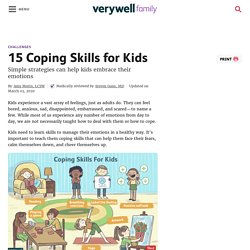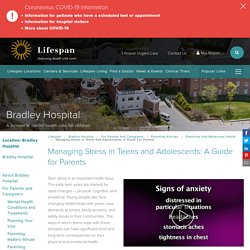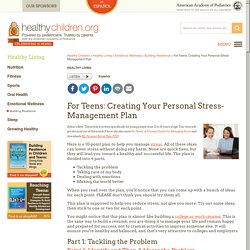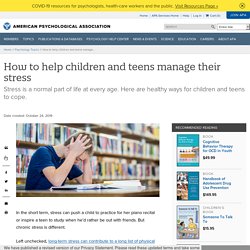

15 Coping Skills for Kids. Kids experience a vast array of feelings, just as adults do.

They can feel bored, anxious, sad, disappointed, embarrassed, and scared—to name a few. While most of us experience any number of emotions from day to day, we are not necessarily taught how to deal with them or how to cope. Kids need to learn skills to manage their emotions in a healthy way. It’s important to teach them coping skills that can help them face their fears, calm themselves down, and cheer themselves up. Why Kids Need Coping Skills Without healthy coping skills, kids are likely to act out—essentially sending a message that says, “I feel out of control so I’m going to act out of control.” Adolescents who lack healthy coping skills may also turn to avoidance coping. For example, instead of working on math homework he doesn’t understand, an adolescent who uses avoidance coping may go play basketball with his friends to avoid doing his homework altogether.
Emotion-Focused vs. Emotion-Focused Coping Skills Useful Tips. 6 common causes of stress in children and teenagers - and tips on how to cope. Most adults think of their childhood as the happiest time of their life, but children and teenagers are prone to suffering from stress too – which, because of its detrimental effect on their mood, can even lead to depression.

Studies show that almost one in four young people will experience depression before they're 19 years old, caused by peer pressure, school worries and a lot more. And with SATs exams coming up this spring for primary school children, plus GCSEs and A-Levels in secondary schools this summer, many young people may be feeling anxious. We asked the experts at CABA to share some of the common triggers and tips on supporting a child who is experiencing stress. Common causes of stress in young people 1. Many children feel under pressure to do well at school. MORE: Celebrities on their mental health struggles: from Prince Harry to Ellie Goulding Schoolwork can be a worry for children and teenagers 2. 3. 4. 5. Managing Stress in Teens and Adolescents: A Guide for Parents. Teen stress is an important health issue.

The early teen years are marked by rapid changes — physical, cognitive, and emotional. Young people also face changing relationships with peers, new demands at school, family tensions, and safety issues in their communities. The ways in which teens cope with these stressors can have significant short-and long-term consequences on their physical and emotional health. What is stress? It is the body’s reaction to a challenge, which could be anything from outright physical danger to asking someone for a date or trying out for a sports team. For Teens: Creating Your Personal Stress-Management Plan. Editor's Note: This article is written specifically for young people from 12 to 18 years of age.

Your teen will get the most out of this article if he or she also reads For Teens: A Personal Guide for Managing Stress and downloads My Personal Stress Plan (PDF). Here is a 10-point plan to help you manage stress. All of these ideas can lower stress without doing any harm. None are quick fixes, but they will lead you toward a healthy and successful life. The plan is divided into 4 parts. Tackling the problemTaking care of my bodyDealing with emotionsMaking the world better When you read over the plan, you'll notice that you can come up with a bunch of ideas for each point.
Personal plan handout. How to help children and teens manage their stress. In the short term, stress can push a child to practice for her piano recital or inspire a teen to study when he’d rather be out with friends.

But chronic stress is different. Left unchecked, long-term stress can contribute to a long list of physical and mental health problems. Prolonged stress can cause high blood pressure, weaken the immune system and contribute to diseases such as obesity and heart disease. It can also lead to mental health problems such as anxiety and depression—disorders that are becoming more common in youth. In a 2018 study, researchers analyzed data from the National Survey of Mental Health and found that rates of anxiety and depression had increased in kids ages 6 to 17, from 5.4% in 2003 to 8.4% in 2011-12. Teen stress: tips to reduce stress. Teenage stress: what is it?

Stress in teenagers – and anyone – can be unpleasant, but it’s not necessarily a bad thing. Stress is the way your body responds to challenges and gets you ready to face them with attention, energy and strength. When you feel you can cope with these challenges, stress gets you ready for action and gives you the motivation to get things done. Everyone experiences stress. There’s nothing wrong with your teenage child if he’s stressed.
Signs of teenage stress Signs of stress in teenagers can show up in their behaviour, emotions, body and thinking. Behaviour signsIf your child is stressed, you might see some changes in your child’s behaviour. Not want to take part in activities she usually enjoys, refuse to go to school, or not do as well at schoolseem nervous or anxioussleep too little or too mucheat more ‘comfort food’ than usual, or eat lessdrink more caffeine products, or take over-the-counter painkillers, use alcohol or other drugs, or gamblebehave aggressively.